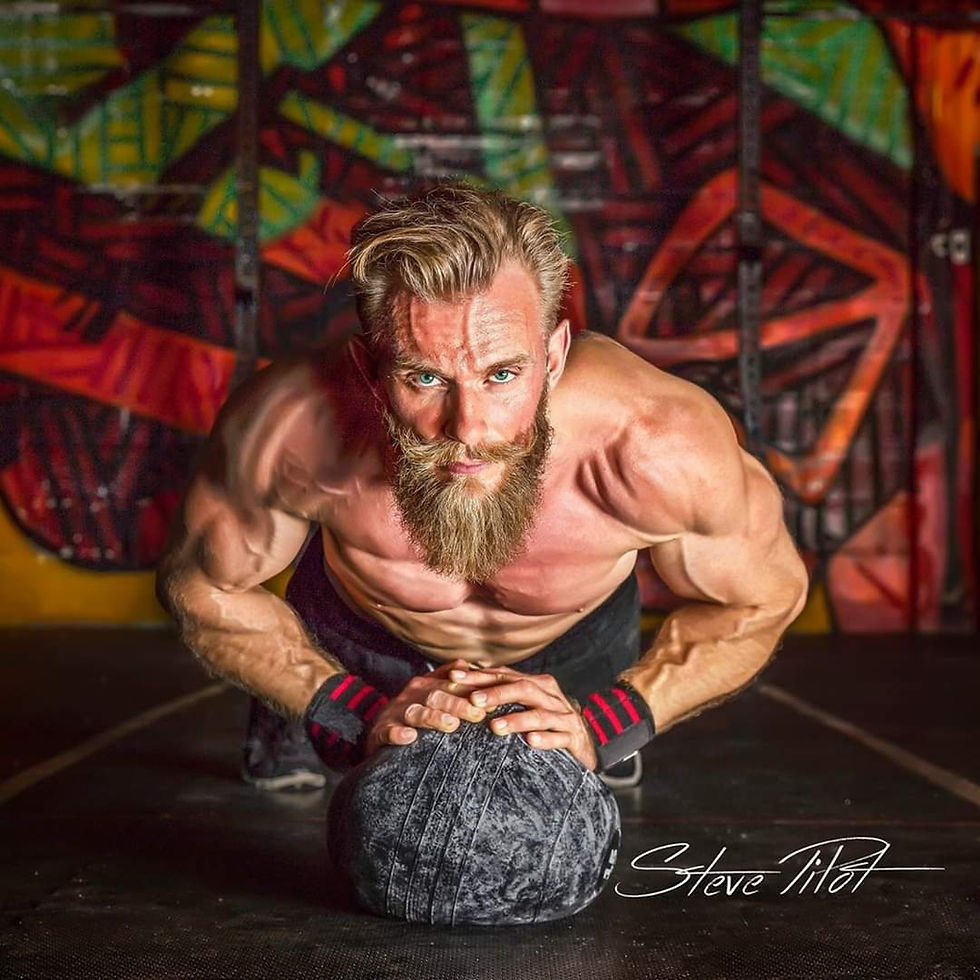The Hidden Nutrient Gaps Vegans Overlook — And How They Sabotage Muscle Growth, Strength, and Recovery
- STEVE PILOT
- Nov 15, 2025
- 4 min read
Vegan athletes and plant-based lifters are stronger, leaner, and healthier today than ever.
But even with the best intentions, many vegans are unknowingly training with a silent disadvantage: nutrient gaps that disrupt strength gains, slow recovery, weaken immunity, and increase long-term health risks.
These deficiencies don’t happen because a vegan diet is “inferior.” They happen because some nutrients require intentional planning — and most athletes simply never learn this part.
The goal of this article is not to scare you away from being vegan.
It’s to help you master it so you can train harder, recover faster, and make long-term progress without hidden setbacks.
Let’s break down the most overlooked nutrient gaps in vegan athletes, why they matter, and how smart planning eliminates all of them.
Vitamin B12 — The Most Common Vegan Deficiency in Athletes
Vitamin B12 is essential for red blood cells, nerve function, strength, and endurance performance.
Research shows that untreated B12 deficiency increases fatigue, slows recovery, and lowers oxygen-carrying capacity.
More info: https://en.wikipedia.org/wiki/Vitamin_B12
The issue is simple: B12 does not naturally occur in plant foods. Fortified foods help, but they’re inconsistent.
Warning signs in athletes:– Unusual fatigue– Slow muscle recovery– Tingling or numbness in hands/feet– Decreased training drive
Solution:A reliable B12 supplement (cyanocobalamin or methylcobalamin) is essential for vegan athletes.
Omega-3 (EPA & DHA) — Critical for Strength, Hormones, and Joint Health
Most vegans get ALA from chia, flax, and walnuts — but the body converts only 5–10% of ALA into usable EPA/DHA, the forms needed for muscle recovery, hormonal balance, brain function, and inflammation control.
Low EPA/DHA affects:– Joint health– Inflammation levels– Mood and motivation– Muscle recovery
Solution:Algae-based EPA/DHA supplements are ideal for vegan athletes.
Iron — Commonly Missed by Vegan Athletes (Especially Endurance Athletes)
Plant-based iron is “non-heme,” meaning the body absorbs it less efficiently than animal sources.According to Harvard Health, iron deficiency can cause anemia, chronic fatigue, and reduced performance.
Symptoms vegan lifters often ignore:– Weakness despite training– Poor pump– Breathlessness– Cold hands/feet
Solution: Combine plant iron sources (lentils, tofu, beans) with vitamin C to increase absorption.
Zinc — Essential for Testosterone, Strength, and Immunity
Zinc supports protein synthesis, hormone production, and immune function. Plant sources contain phytates, which block zinc absorption, making deficiency more likely in vegans.
More info: https://en.wikipedia.org/wiki/Zinc
Low zinc in athletes leads to:– Decreased strength– Hormonal imbalance– Frequent illness– Poor recovery
Solution:Use zinc-rich foods (pumpkin seeds, legumes) and consider supplementing if training heavily.
Calcium — Not Just for Bones (It Affects Muscle Contraction Too)
Calcium deficiency is more common in vegans than expected, especially among athletes avoiding fortified products.
Harvard Health reports that low calcium affects bone density and neuromuscular function.
It impacts:– Muscle contractions– Injury risk– Long-term bone strength
Solution: Fortified plant milks, leafy greens, tofu (calcium-set), and supplements if needed.
Iodine — A Silent Performance Killer in Vegan Diets
Iodine controls thyroid function — which controls metabolism, energy, fat-burning, and recovery.
The issue:
vegans rarely consume iodized salt or seaweed regularly.
Low iodine leads to:– Slowed metabolism– Constant fatigue– Poor muscle building– Hormonal imbalance
Solution: A once-per-day iodine supplement or regular consumption of iodized salt/seaweed.
Leucine — The Trigger for Muscle Protein Synthesis
Leucine is the amino acid that activates muscle-building.
Studies published on PubMed show that leucine thresholds matter — and many vegan meals fall short.
More info: https://pubmed.ncbi.nlm.nih.gov/34836139/
Without enough leucine:– Your “muscle protein synthesis” switch stays OFF– Progress stalls– Recovery slows
Solution: Use high-leucine foods (soy, lentils, edamame) or supplement with vegan BCAAs if needed.
Creatine — Vegans Have Significantly Lower Baseline Levels
Creatine is one of the most researched and effective supplements for:– Strength– Explosive power– Muscle volume– Recovery
Vegans naturally have lower baseline creatine levels because plant foods lack it.
More info: https://en.wikipedia.org/wiki/Creatine
Solution: 3–5g daily of vegan creatine monohydrate.
Why These Gaps Don’t Mean Veganism Is “Less Effective”
Every nutrient issue above has a simple fix.
Being vegan is not the problem — being uneducated about vegan athletic nutrition is the problem.
When properly addressed, vegan athletes can:– Build equal muscle– Recover faster– Improve inflammation– Increase longevity– Perform at elite levels
The key is intentional planning.
How a Coach Solves These Issues
This is where professional coaching becomes valuable.
A coach ensures you:– Hit all nutrient targets– Balance macros with training goals– Correct deficiencies before they affect performance– Train in alignment with a plant-based physiology– Avoid trial-and-error mistakes
You maintain the ethics and health benefits of vegan living — without sacrificing strength or progress.
Final Thoughts
Vegan athletes can achieve peak performance, build serious muscle, and stay healthy long-term.
But missing key nutrients can silently slow everything down.
Once these gaps are corrected, most vegan lifters experience a dramatic improvement in energy, strength, and recovery.
If you take your training seriously, optimizing these nutrients is not optional — it’s essential.





Comments